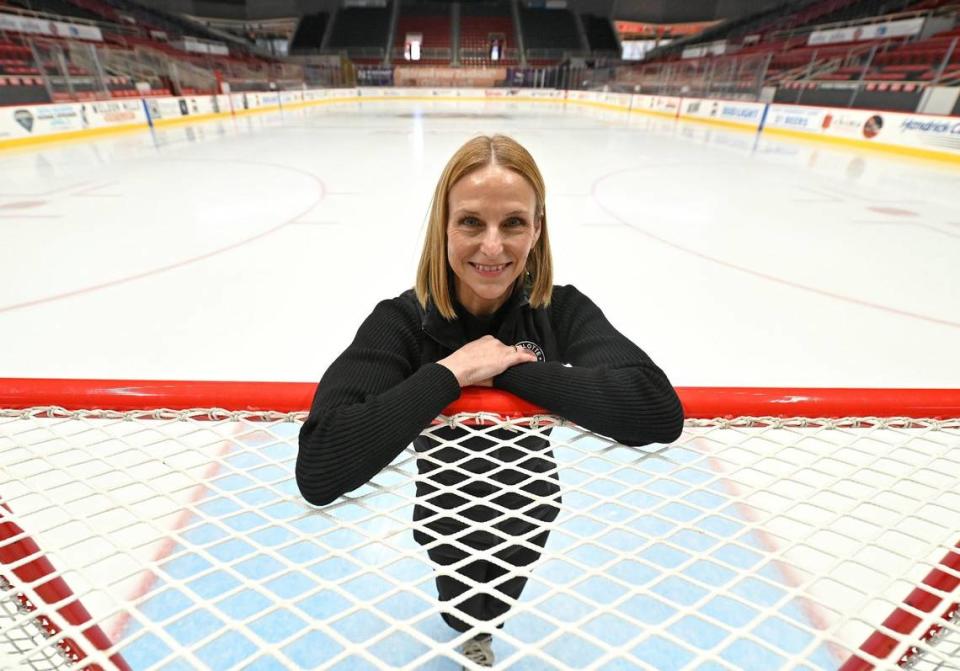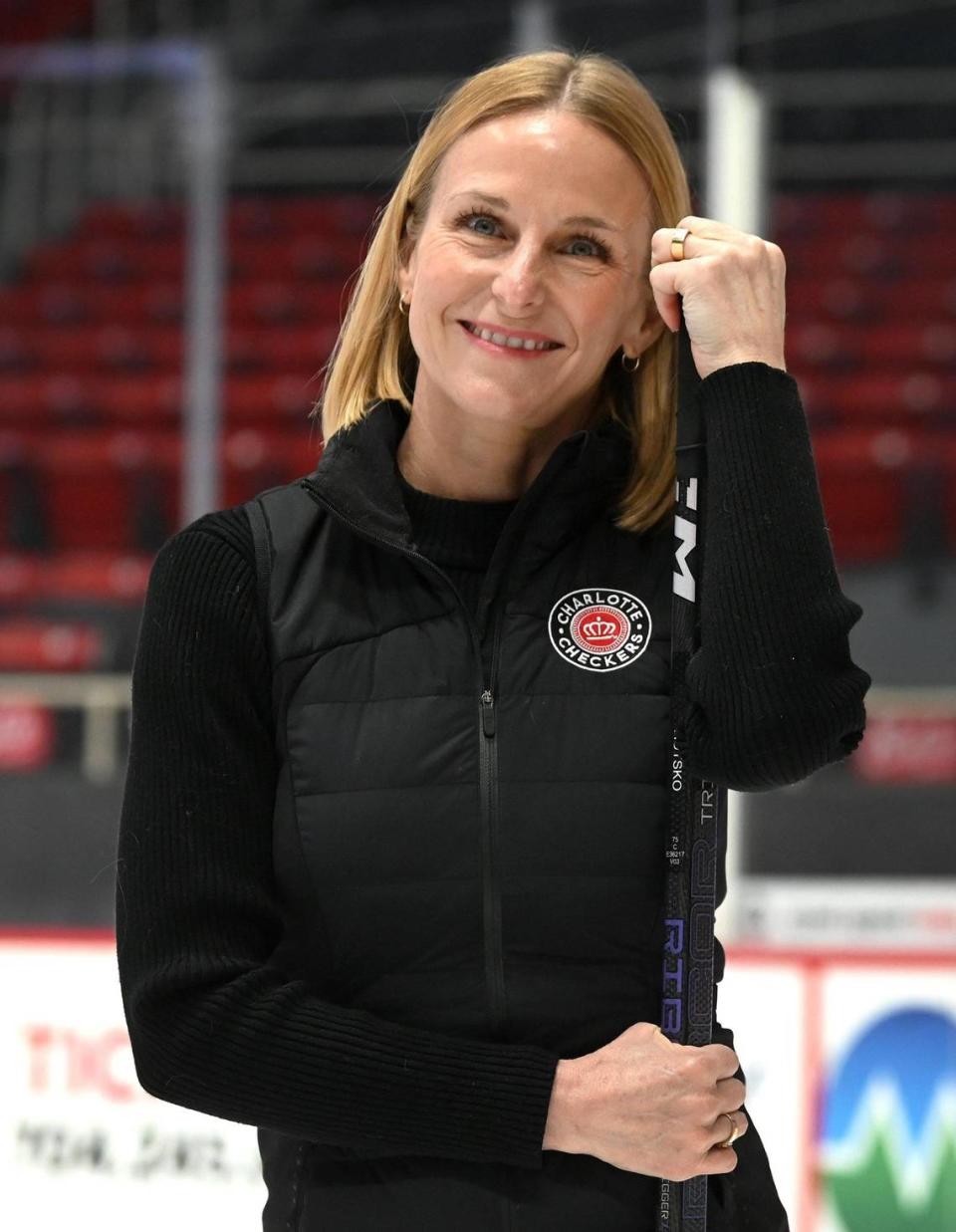Tera Black’s the driving force behind the Charlotte Checkers, helps keep dreams alive
Twelve years ago, Tera Black was participating in a local golf tournament.
Everyone there seemed to know Black, the Charlotte Checkers’ chief operating officer. Her strong personality caught the attention of Mary Grams, a sports executive who’d moved to Charlotte to pursue a career in motorsports 20 years prior.
Something about Black resonated with Grams. She was constantly laughing and hugging her peers as she greeted them, and had a knack for taking care of those around her. But as fun as she seemed, Grams could tell then that Black was a leader who knew how to take honest criticism and when to call out nonsense.
Grams, a Minnesota native who grew up watching hockey, came home from the golf course that evening and told her husband: I want to work for Tera Black.
“There’s something about her. I don’t know what it is,” Grams, the Checkers’ vice president of corporate partnerships since February 2013, said in a recent interview with The Charlotte Observer. “And I have never regretted the decision. I will work for her until the day I retire.”
While many minor-league teams hire employees on a short-term basis, Black looks to hire people who fit the organization and keep them for as long as she can. The Checkers have seen significant employee retention, and a handful of the front office members have been with the team for more than a decade.

Black treats her co-workers like a family. Having a husband, Jamie — who is the Checkers’ director of finance — and two daughters who’ve grown up watching the team, she understands how overwhelming school, sports and other extracurricular activities can be and ensures her employees have time to spend with their families.
“We have a very small staff. I mean, we’re 15 to 18 people in the front office on a strong day,” Black said. “Coming out of the pandemic, it was a tough period of time, and these people have been together and worked together in the trenches for a long time.”
‘Tera allows that dream to stay alive’
Black doesn’t necessarily make her employees be in the office at 9 a.m. for a game that isn’t till night. She’ll give them time to grocery shop, mow their lawn as needed.— things people who /oftenconsistently work Friday and Saturday nights may not have as much time to do.
In January, the Checkers played the first professional outdoor hockey game in the city of Charlotte — on a chilly Saturday night. She welcomed all of her employees’ families to the historic event.
“The answer is very simple, and it’s Tera Black,” senior vice president Shawn Lynch said about what’s made him stay with this organization. “You get kids who are 21, 22, 23 years old, and they really want to work in sports. That’s their dream, and then they find out that it’s really long hours, that it’s a lot of work.”
Lynch has been with the team since 2004 and explained working with the Checkers isn’t what most people might expect.
“You’re not interacting with the players all the time, it’s not as cool as it is from the outside and that dream kind of fades away,” Lynch said. “Tera allows that dream to stay alive for a lot of people.”
Black came to Charlotte from her native California in 2006, initially being recruited by owner Michael Kahn for a secondary role.
In her eyes, many executives would take a role with a professional sports team and stay there about five years. Then, they’d start looking for a better job on their resume, or an opportunity to move to another city, especially with companies constantly recruiting online.
When the Blacks moved to Charlotte, they felt the city was a nice place to raise kids but didn’t necessarily see it as a long-term destination.
Now, the family has made it their home.
“Your grass is greenest where you water it,” Black said. “I enjoy this location, our staff, the ownership so much, there’s no reason to ever leave. It’s just one of the best places on the planet to live, in my opinion.”
Paul Branecky, a South Mecklenburg High and UNC graduate, joined the Checkers in 2011 after six seasons with the Carolina Hurricanes. He has three children, and he wanted to raise a family in Charlotte while still working in hockey.
It wasn’t extremely important to him that he was moving down from the NHL level. He’s relished the affordability that minor-league events provide compared to the big leagues, offering a similar entertainment experience for significantly cheaper ticket prices, and the atmosphere in his workplace has provided exactly what he wanted.
“A lot of us have seen that the grass is not always greener,” said Branecky, the Checkers’ vice president of marketing and communications. “It’s all about fit. It’s all about leadership, it starts at the top with Tera and Michael allowing us to do what we do.”

From the Sierra Nevada mountains to the Queen City skyscrapers
When growing up in the Eastern Sierra, Black took up organized sports — such as basketball, volleyball, softball and track — as soon as she was old enough, cross-country skiing in the Sierra Nevada mountains. An only child, she often followed her father, who worked on the ski patrol for Mammoth Mountain, in her hometown of Mammoth Lakes, California.
Black is 5 feet, 2 inches tall and played point guard for her high school and middle school basketball teams. She won two California high school state championships and played against future three-time WNBA MVP Lisa Leslie.
Her initial goal was to be an athletic trainer, and she had quite the non-traditional college experience. She started at community college after graduating high school in 1990 and didn’t finish at San Diego State University until 2001.
Black’s first foray into hockey came as a 22-year-old student at Sierra College, when the Sacramento River Rats’ team doctor asked if she wanted to help him out. Manon Rheaume — the first woman to play in an NHL exhibition game, with the Tampa Bay Lightning — was the now-defunct roller hockey team’s goalie at the time, and she was the only other woman in the building.
Black immediately realized how much she loved working in sports, namely hockey. Being one of so few women, she felt that added to the privilege — she was holding a role traditionally occupied by a man.
“I felt embraced by the sport from the very beginning,” Black said. “That said, the job in general does not lend itself, in the early days, to growing a family, so to speak. Just about the amount of time required, the season, it was very difficult in that way.
“Yeah, I’ve definitely had to prove myself over and over and over again, probably more so than if I were not a woman. And that’s OK. I mean, there’s not a whole lot of us to compare me to. And it’s somewhat risky, I think, especially in the early days, to say, yeah, let’s give her a whirl.
“You don’t know, I could completely screw something up because I just don’t have the institutional knowledge that my male counterpart would have.”
Black worked throughout the 11-year span that she was taking college courses. She eventually became the River Rats’ head athletic trainer and director of hockey operations, along with serving as vice president of hockey operations for the North American Roller Hockey Championships.
After graduating from San Diego State, she became the chief operating officer of the San Diego Gulls, who were in the East Coast Hockey League at the time. She said she was pretty much running the team by herself, as the owner had taken a hiatus.
The Checkers were also in the ECHL then, and former Gulls president Jeffrey Longo — Black’s predecessor — was at the helm in Charlotte. Black felt that she and her husband wanted to have a second child eventually and knew she’d want to take a slightly smaller role during that time. Kahn recruited her, and she became the Checkers’ vice president in 2006.
Longo, the Checkers’ president, left in 2008 to become the New Jersey Devils’ vice president of marketing and community development. It was roughly a month into Black’s maternity leave, and as soon as she had her second child, she was thrust back into a sole leadership role.
‘You’ll never leave her’
Her well-rounded career has made her a stronger executive. Even though she didn’t end up as the Checkers’ athletic trainer, she has the ability to lend a hand in nearly every area of the sport.
She can recall multiple situations when Checkers players got injured and she was able to understand exactly what the trainers were saying. She was also previously an equipment manager, and she’s been known to sew patches on referees’ jerseys when in a pinch before a game.
At the outdoor game, where Black made an effort to shake hands with every partner who sponsored the event, some former Checkers employees stopped by.
“Past employees who are here tonight have said they didn’t realize how amazing this organization was until they left and went somewhere else,” Grams said. “They said they learned so much from us.
“We realize that we are a minor league, developmental hockey team, so a lot of people are a stepping stone. They come here and they want to go to the big leagues — the NHL, NFL, NBA, NASCAR — but they will say, gosh. We really learned so much from what you guys have. Tera’s figured out a way to have work and life balance, and that’s her No. 1 thing.”
A lot has happened since Black arrived in Charlotte, and many of her employees have been there through all of it.
She led the Checkers, now the Florida Panthers’ affiliate, into the AHL in 2010, when they entered an affiliation agreement with the Carolina Hurricanes. Five years later, she oversaw the franchise’s move from uptown to a renovated Bojangles Coliseum. In 2019, the Checkers raised the Calder Cup as AHL champions, and then she navigated the organization through a pandemic.
Black hopes to see more women in leadership in the future. She’s noticed there are a lot of strong up-and-comers, but not as many are returning after they start raising a family.
But Black’s hard work has entrenched her into a career as a sports leader. A few weeks after that golf tournament, Grams’ husband met her for the first time.
“I see why you want to work for her,” Grams remembers her husband saying. “And he said, ‘you’ll never leave her.’”

